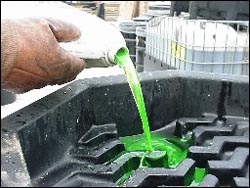
What is Antifreeze?
Antifreeze is the engine coolant in most internal combustion engines that is used as a freeze protection and as a heat transfer medium for motor vehicles. Maintenance guides suggest antifreeze be flushed every 1-2 years. The most common type is made of ethylene glycol, a material that is toxic to humans and animals in small doses. Used antifreeze is hazardous to the environment if it contains dissolved heavy metals such as lead, tin, copper, zinc, and iron. A less toxic antifreeze made of propylene glycol may still contain some contaminates such as gas or oil that make it potentially hazardous also.
How to dispose of used antifreeze?
Used antifreeze should never be dumped on land or discharged in the storm drain, ditch, or septic system. Some sanitary sewer systems are capable of handling small amounts of used antifreeze. To learn more contact your local sanitary sewer system.
In Tennessee, used antifreeze may be recycled either 1) in an on-site unit, 2) a mobile unit, or 3) off-site. Recycled antifreeze is more cost effective than virgin antifreeze and it eliminates the need for disposal. To find a collection site near you call 1-800-287-9013. Used antifreeze is also accepted by Tennessee's Household Hazardous Waste Collection Program. For a listing of businesses that recycle used antifreeze, oil, and filters click here.
For more information about best management practices for auto repair and antifreeze recycling visit the Environmental Protection Agency's Pollution Prevention Web.
For more information about Tennessee's Used Oil Program, please contact Paula Mitchell at 615-532-9265 or by email at [email protected]. For regulatory and compliance issues, please contact the Division of Solid Waste Management, Nina Vo at 615-532-9268 or by email at [email protected].



